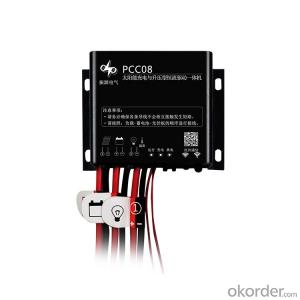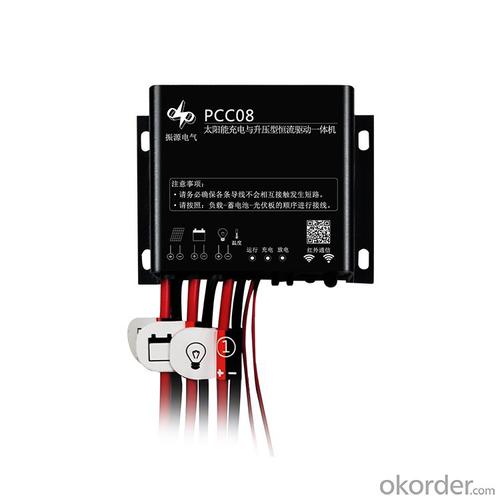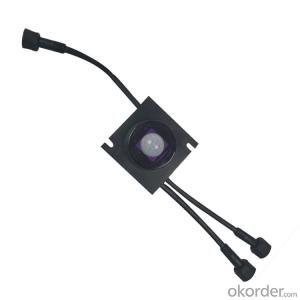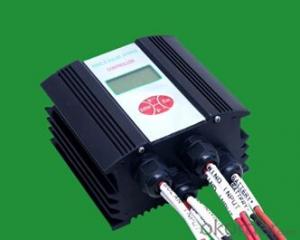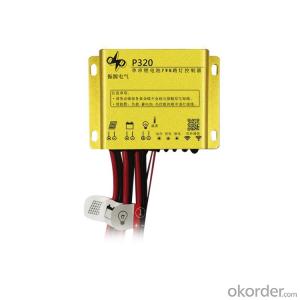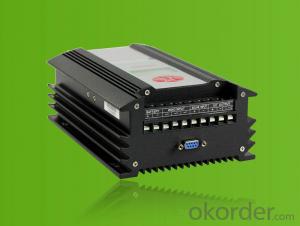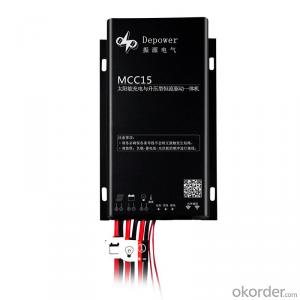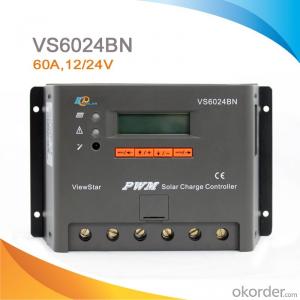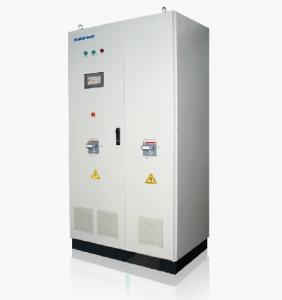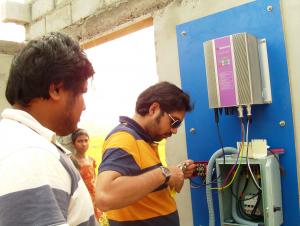Studer Solar Controllers IP68 PCC08 8A 12V PWM Solar Charger Controller for Solar Street Light
- Loading Port:
- China main port
- Payment Terms:
- TT OR LC
- Min Order Qty:
- 1 pc
- Supply Capability:
- 1000 pc/month
OKorder Service Pledge
OKorder Financial Service
You Might Also Like
1.Features :
*Professional design to promote system reliability
-Using international well-know brand semiconductor device.
- High LED driving, significantly reduce the product temperature.
- IP68 protection degree without any buttons, further improve the waterproof reliability.
*Discharge efficiency
- LED constant current drive efficiency up to 96%
-Dimming LED constant current drive efficiency from 91%-96%
*Minimal power consumption
-The current consumption ≤10mA
*Intelligent battery management
-It is PWM and CV charge, which matches with Li protect board perfectly.
- Significantly extends the battery lifetime up to 50% base on intelligent temperature
compensation charge and discharge management.
- Intelligent energy management of battery ensures that the battery charge & discharge in
shallow state which significantly extend the battery life.
*Intelligent LED drive management
- Light control function, automatic lights LED in the dark, turn off automatically at dawn
- Constant current drive
- three times control.
- Delaying infrared body sensor
- Morning lighting
- Dimming function, control to output different power in different typical time.
*Flexible parameter set
- Excellent man-machine interface, convenient operation.
- Infrared wireless communications, connecting with a handheld remote control for easy installation.
*Protect function
- Battery and the solar panel reverse connection protection.
- To prevent the battery discharge to the solar panel .
- Battery low voltage disconnect and reconnect voltage protection.
-The LED output short and open circuit protection.
2. Technical parameter
Model | PCC08 G4 |
System voltage | 12V |
Output power | 40W/12 V |
Static power consumption | 13 mA/12 V |
Rated charging current | 8 A |
Solar panel power | ≤ 120 W |
Solar panel open-circuit voltage | < 25 V |
MPPT tracking efficiency | 96% |
Typical constant current source efficiency | 90% to 96% |
Overvoltage protection | Overcharge voltage 2 V |
Charging voltage limit | Overcharge voltage 1 V |
Current accuracy | ±3% |
Over-temperature protection | 85 °C |
Light control voltage | 16 V ~50 V |
Operating temperature | -35 °C ~+60 °C |
Protection degree | IP68 |
Weight | 180g |
Dimensions (mm) | 58*82*23.5 |
3. Images
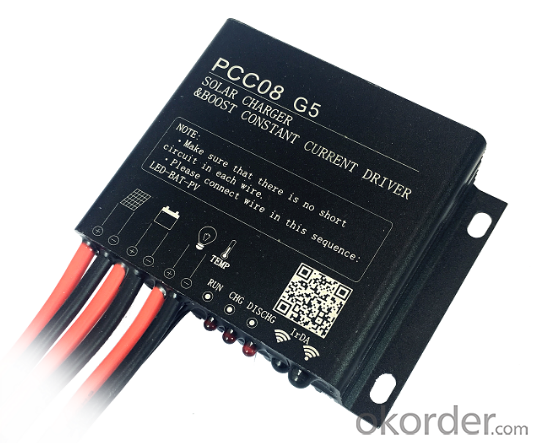
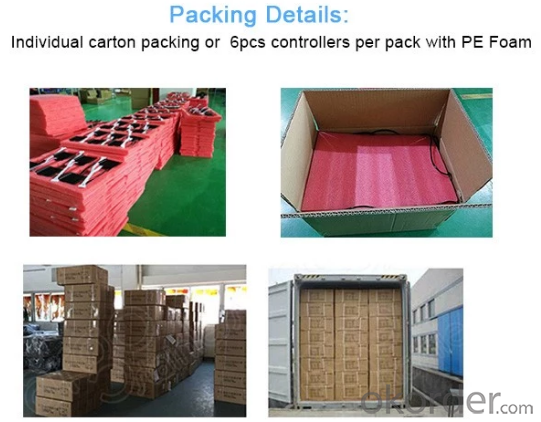
4.FAQ
Q: DO YOU HAVE ANY CERTIFICATION FOR YOUR PRODUCTS?
A: We have ISO9001:2015, CE、 RoHS certifications for all of our products.
Q: DO YOU HAVE MOQ FOR PLACE ORDER?
A: Low MOQ, 1pe for sample checking is available.
- Q: How does a solar controller handle the protection against high voltage transients?
- A solar controller handles the protection against high voltage transients by employing various protective measures. These measures include surge protection devices, voltage clamping circuits, and overvoltage protection modules. These components work together to detect and limit the voltage spikes that may occur in the solar panel system. By diverting or suppressing the excess voltage, the solar controller ensures that the system and its connected devices are safeguarded from potential damage caused by high voltage transients.
- Q: Can a solar controller be used with a solar-powered irrigation system?
- Yes, a solar controller can be used with a solar-powered irrigation system. The solar controller helps manage the flow of electricity from the solar panel to the irrigation system, ensuring efficient operation and preventing overcharging of the batteries.
- Q: Can a solar controller be used with a portable solar generator?
- Yes, a solar controller can be used with a portable solar generator. A solar controller helps regulate the flow of electricity from the solar panels to the battery, preventing overcharging and optimizing charging efficiency. Using a solar controller with a portable solar generator ensures that the generator's battery is properly charged and protected, extending its lifespan and improving overall performance.
- Q: What is the maximum charging current that a solar controller can provide to batteries?
- The maximum charging current that a solar controller can provide to batteries depends on the specific model and capacity of the controller. It can range from a few amps to several hundred amps, with larger controllers typically having higher charging capacities.
- Q: Can a solar controller be used with a solar-powered aquaponic system?
- Yes, a solar controller can be used with a solar-powered aquaponic system. A solar controller helps regulate the power output from the solar panels to ensure efficient charging and usage of the batteries in the system. It can also monitor and control various aspects such as voltage, current, and temperature to protect the system and optimize its performance.
- Q: Can a solar controller be used with solar panel boat mounts?
- Yes, a solar controller can be used with solar panel boat mounts. The solar controller regulates the charging process of the battery by monitoring the voltage and current from the solar panels. It ensures that the battery is charged efficiently and protects it from overcharging and damage. Regardless of the mounting location, a solar controller is essential for optimal performance and longevity of the battery in a boat solar system.
- Q: Can a solar controller be used with a solar-powered residential community?
- Yes, a solar controller can be used with a solar-powered residential community. A solar controller is an essential component of a solar power system, and it helps regulate and optimize the charging and discharging of batteries. In a solar-powered residential community, the solar controller would be responsible for managing the flow of electricity from the solar panels to the community's battery storage system, ensuring efficient use of the generated solar energy.
- Q: Can a solar controller be used in a solar-powered electric scooter charging system?
- Yes, a solar controller can be used in a solar-powered electric scooter charging system. The solar controller plays a crucial role in regulating the flow of electricity from the solar panels to the battery of the electric scooter. It ensures that the charging process is safe and efficient by monitoring and controlling the voltage and current.
- Q: What is the typical standby power consumption of a solar controller?
- The typical standby power consumption of a solar controller can vary depending on the specific model and brand. However, most modern solar controllers have a very low standby power consumption. On average, the standby power consumption of a solar controller can range from as low as 0.1 watts to around 1 watt. The low standby power consumption is achieved through efficient design and the use of advanced power-saving technologies. These controllers are designed to minimize energy waste and ensure that they consume only a minimal amount of power when not actively controlling the solar system. It is important to note that standby power consumption can also depend on various factors such as the size of the solar system, the complexity of the controller's features, and any additional accessories connected to the controller. Therefore, it is always recommended to refer to the specific product specifications provided by the manufacturer to determine the exact standby power consumption of a particular solar controller.
- Q: Solar controller one machine how
- You should include a charge and inverter as one of the machines. This product is also very good, but for many users is not very applicable, such as I hope to enter the input, but the output power can not meet, and configure the inverter is more waste. If your needs and configuration just right, it is still relatively easy to use. The cost of the above is higher.
Send your message to us
Studer Solar Controllers IP68 PCC08 8A 12V PWM Solar Charger Controller for Solar Street Light
- Loading Port:
- China main port
- Payment Terms:
- TT OR LC
- Min Order Qty:
- 1 pc
- Supply Capability:
- 1000 pc/month
OKorder Service Pledge
OKorder Financial Service
Similar products
Hot products
Hot Searches
Related keywords
